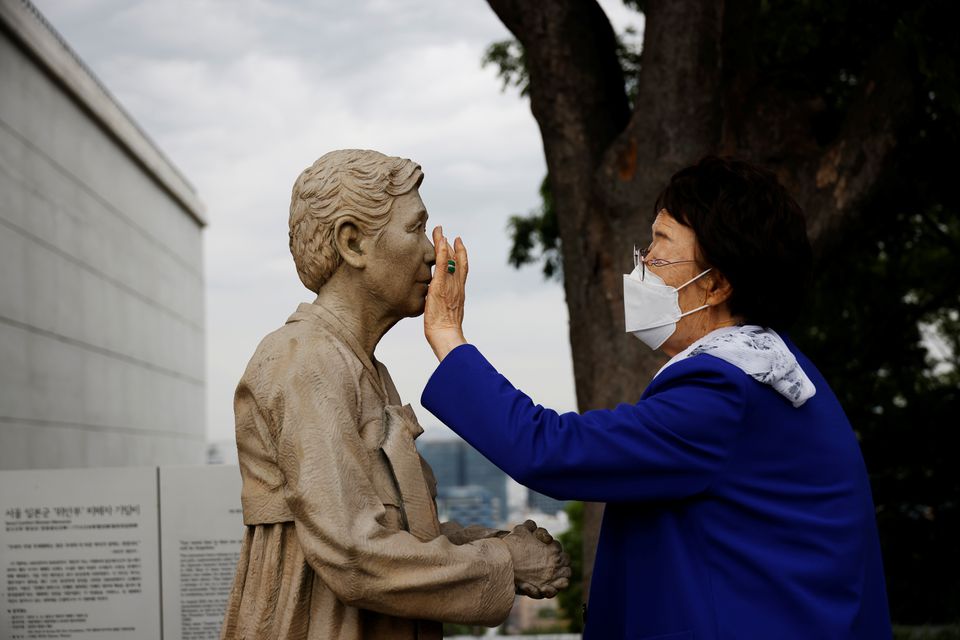“It was not a place for human beings”, said Lee Ok-Seon a former comfort women.
During the WWII Japan implemented ‘comfort stations’. Accordingly to the Japanese administration the ‘comfort station’ were implemented for three main reasons. First of all, those brothels were conceived as military facilities. It was aim to reduce the number of rape and sexual assault. But the establishment of this system did nothing but increase the sexual violence that already existed in the battlefield and the sexual desire was stimulated rather than appeased, so it is hard to think that those brothels were created to prevent rape. The second reason was that soldiers were experimented tough times and frustration so in order to improve their abilities the government provide them with ‘comfort women’. In the pre-war manly culture of Japan, comfort was associated with liquor and prostitution. Lastly, le third reason that was brought by the Japanese government, was counter intelligence, in other words: spy prevention. The military banned soldiers from entering private brothels and made comfort stations which were totally supervised and controlled by the military. Indeed, the ‘comfort station’ could be seen as some sort of organization, with rules, schedule, where the women were ’employed’.
The gender hierarchy in imperial Japan facilitated the establishment of a military sexual slavery system while sexual double standards associated with the patriarchal ideology in Korea contributed to the suffering of Korean victims for more than 50 years. No official number of victims was ever published but the historian Joanna Bourke estimated that around 160000 women from different nationalities were victims of this sexual slavery according her 80% of them were Korean. Usually, these women were really young, the majority of them were underage and came from a poor background, their family were facing financial difficulties. The women’s impoverished family background partly made them more vulnerable to mobilization to military brothels.
The implementation of those ‘comfort stations’ rise a lot of consequences for the women who were abused and raped. Instead of reducing the number of rapes as it was supposed to, this number increased and the sexual transmitted infections too. The ‘comfort women system’ didn’t bring the results the Japanese government was expecting. Due to the physical violence and rape they were victim of, these women were often diagnosed with mental illnesses and Post Traumatic Stress Disorder was very common at that time. Sometimes, when they survived, these women were totally rejected by their families and either choose to move to another country or in the worst cases to commit suicide. As Lee Ok-Seon told to a journalist of the Deutsche Welle, in 2013, I decided I would rather spend the rest of my days in China. How could I have gone back home? It was written on my face that I was a comfort women.
It is only in 1991, that some former comfort women started to reveal what they experienced years ago. A year later, the historian Yoshiaki Yoshimi published his work in which, based on 1946 documents, he proved a relation between the Shōwa era army and the ‘comfort stations’. Japan responded really quickly by recognizing the participation of the army in the implementation of those ‘comfort station’. Few years later, the international community started to get interested in that scandal. Two reports were presented to the United Nations, the first one in 1996 and the second in 1998. The latest recommended to Japan to recognized its responsibility in the implementation of the ‘comfort house’, to sincerely apologize to the victims, to create a rigorous mechanism for investigating the system of military sexual slavery and make this mechanism accessible to the population and ensure the preservation of documentation and to create educational projects about this part of history. In 2015, after many discussions South Korea and Japan made an agreement in which Japan apologized and gave around $8 millions to victims. Accordingly to the historian Stöver, the Japanese apologies were isolated occurrences, there was (and still) never a full admission of the guilt. Indeed, last year, on January 8th, South Korean justice ordered Japan to compensate 12 comfort women. This decision was strongly criticized by the Japanese government.
For this reason, since 1992, every Wednesday in front of the Japanese Embassy in Seoul, women gathered to claim their rights and to keep this fight alive. Their main goal is to get the sexual slavery they were victim of recognized as a war crime.
Image – Reuters.com

